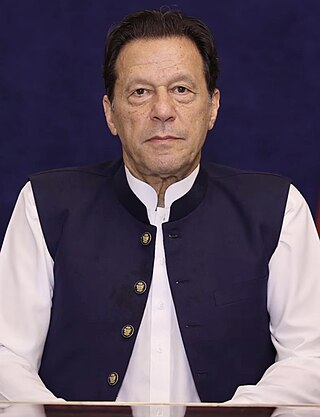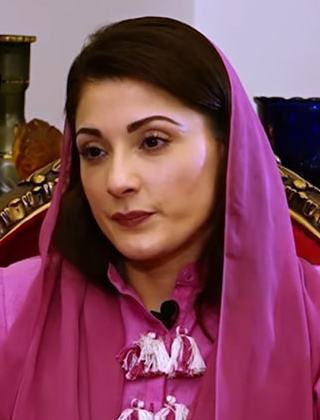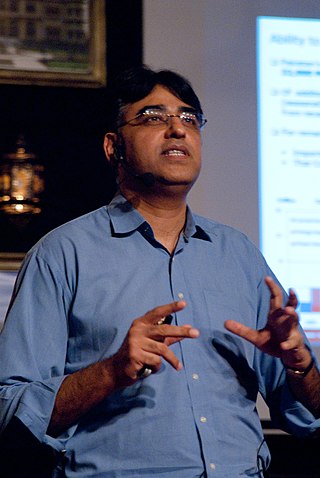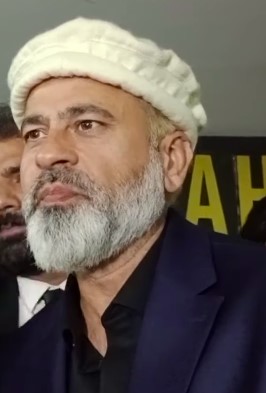
Imran Ahmed Khan Niazi is a Pakistani politician and former cricketer who served as the 22nd prime minister of Pakistan from August 2018 until April 2022. He is the founder and former chairman of the political party Pakistan Tehreek-e-Insaf (PTI) from 1996 to 2023. He was the captain of the Pakistan national cricket team throughout the 1980s and early 90s.

The Pakistan Tehreek-e-Insaf is a political party in Pakistan established in 1996 by Pakistani cricketer and politician Imran Khan, who served as the country's prime minister from 2018 to 2022. The PTI ranks among the three major Pakistani political parties alongside the Pakistan Muslim League–Nawaz (PML–N) and the Pakistan People's Party (PPP), and it is the largest party in terms of representation in the National Assembly of Pakistan since the 2018 general election. With over 10 million members in Pakistan and abroad, it claims to be the country's largest political party by primary membership, as well as one of the largest political parties in the world.

Rana Sanaullah Khan is a Pakistani lawyer and politician who served as the 39th Interior Minister of Pakistan. He had been a member of the National Assembly of Pakistan from August 2018 till August 2023. He is a senior member of PML-N and the President of PML-N in Punjab province since 4 May 2019. Before getting elected to the National Assembly of Pakistan, Sanaullah had been elected to the Provincial Assembly of Punjab five times and had served in high-ranking ministries of the province.

Maryam Nawaz Sharif is a Pakistani politician, currently serving as the 20th Chief Minister of Punjab, in office since 26 February 2024. She is the daughter of former Prime Minister of Pakistan Nawaz Sharif and her initial involvement in public life was through her family’s philanthropic organisations. However, her political career began in earnest in 2012 when she took charge of the election campaign for the 2013 general elections. Following the elections, she was appointed as the Chairperson of the Prime Minister’s Youth Programme in 2013. Despite her active role, she resigned from the position in 2014 after her appointment was legally challenged in the Lahore High Court.

Asad Umar is a Former Pakistani politician who had been a member of the National Assembly of Pakistan from September 2013 till May 2018 and again from August 2018 to January 2023. He served as the Federal Minister for Planning, Development, Reforms and Special Initiatives, from 19 November 2019 to 10 April 2022.

General elections were held in Pakistan on 25 July 2018 to elect the members of the 15th National Assembly and the four Provincial Assemblies. The three major parties were Pakistan Tehreek-e-Insaf (PTI), led by Imran Khan, the Pakistan Muslim League, led by Shehbaz Sharif, and the Pakistan People's Party, led by Bilawal Bhutto. The PTI won the most seats in the National Assembly but fell short of a majority; the party subsequently formed a coalition government with several smaller parties. At the provincial level, the PTI remained the largest party in Khyber Pakhtunkhwa (KP); the Pakistan Peoples Party (PPP) retained its dominance in Sindh; and the newly formed Balochistan Awami Party (BAP) emerged as the largest party in Balochistan. In Punjab, the result was a hung parliament, with the Pakistan Muslim League (N) winning the most seats. However, after several independent MPAs joined the PTI, the latter became the largest party and was able to form a government.

Shehryar Khan Afridi is a Pakistani politician who served as Chairperson of the Parliamentary Special Committee on Kashmir, in office from 13 May 2020 to April 2022. He served as the Minister of State for Interior from 31 August 2018 to 18 April 2019. He has been a member of the National Assembly of Pakistan since February 2024 and previously served as a member from August 2018 till January 2023 and June 2013 to May 2018. He also served as the Minister of State for States and Frontier Regions (SAFRON) from 18 April 2019 until 25 September 2020. He was also given an additional charge of the Ministry of Narcotics Control after the death of Ali Mohammad Mahar.

General elections, originally scheduled to be held in 2023, were held in Pakistan on 8 February 2024 to elect the members of the 16th National Assembly. The Election Commission of Pakistan announced the detailed schedule on 15 December 2023.

Syed Asim Munir Ahmed Shah NI(M) is a Pakistani general and the current Chief of Army Staff since 29 November 2022. Before becoming the army chief, he was posted at the GHQ as Quartermaster general. He commanded the XXX Corps in Gujranwala from 17 June 2019 to 6 October 2021. He served as the 23rd Director-General of the ISI until he was replaced by lieutenant general Faiz Hameed on 16 June 2019. Munir received the Sword of Honour for his performance as a cadet in the Officers Training School, Mangla.
Lettergate is an American-Pakistani political affair set off by a conversation at a farewell lunch for Asad Majeed Khan, the then-Pakistani ambassador to the United States, which took place on 7 March 2022 at Khan's official residence, also known as Pakistan House. A diplomatic telegram sent by Ambassador Khan to the Ministry of Foreign Affairs was based on the notes taken by the note-taker, who was from the embassy of Pakistan based in Washington, D.C. The telegram allegedly stated that in the course of the meeting the United States had expressed a desire to the government of Pakistan for prime minister Imran Khan to be removed from office because of his refusal to abandon his neutral stance on the war between Russia and Ukraine and back the Ukrainians, with a promise of warmer relations if his removal occurred, and threatening isolation if it did not. The lunch was attended by US officials including then US Assistant Secretary of State for South and Central Asian Affairs Donald Lu and Deputy Assistant Secretary Lesslie Viguerie. The Pakistani diplomats attending the lunch meeting included Deputy Chief of Mission Syed Naveed Bokhari and the defence attaché.

Imran Riaz Khan is a Pakistani journalist, anchor and YouTuber.
The 2022 Azadi March I was a protest march initiated by the ousted former Pakistani prime minister and Pakistan Tehreek-e-Insaf party chairman Imran Khan against the government of his successor, Prime Minister Shehbaz Sharif. On 24 May 2022, Khan announced a long march towards Islamabad starting on 25 May 2022. Khan lead the march from Peshawar, the capital of Khyber Pakhtunkhwa, where his provincial government helped him. Senior PTI members lead the march from Lahore, the capital of Punjab.
On 3 November 2022, Imran Khan, former prime minister of Pakistan and chairman of the Pakistan Tehreek-e-Insaf (PTI) political party, was shot in an assassination attempt in Wazirabad, Punjab, during the 2022 Azadi March II against the Pakistan government. The gunman also injured a number of other PTI leaders and killed a supporter.
Ali Bilal, popularly known as Zilleh Shah, a political worker of the Pakistan Tehreek-e-Insaf and resident of Jahangir Town died on 8 March 2023 in Services Hospital shortly after being released from police custody. A post-mortem report confirmed the cause of death to be excessive bleeding due to severe torture with injuries on his genitals and skull, which were likely sustained while he was in custody.

The 2022–23 Pakistan political unrest was a series of political crises after the ousting of former prime minister Imran Khan through a no-confidence motion in April 2022. The crises began in 2022 when the opposition joined hands and submitted a no-confidence motion against Imran Khan's government in the National Assembly. Prime Minister Imran Khan urged the Pakistani establishment not to stay neutral and play its role to save his government and not let historical rival politicians with alleged corruption charges take over, but the establishment refused.
On March 14, 2023, a wave of protests erupted after the Punjab Police attempted to arrest the former prime minister of Pakistan, Imran Khan, nearly one year after his removal from office. The climax of a series of events — including, but not limited to, Khan being charged under anti-terror laws after accusing government officials of unlawfully torturing an aide, his removal from office, and an attempt on his life five months prior — the attempted arrest led to Pakistan Tehreek-e-Insaf (PTI) party workers and supporters clashing with police outside Khan's residence in Lahore, despite the arrest being called off. The clashes, which persisted for several days, led to the arrests of party workers, supporters being suppressed with tear gas and water cannons, as well as 54 police officers being "seriously injured".
Usman Anwar is a Pakistani police officer who is Inspector General of the Punjab Police in the province of Punjab, Pakistan since 24 January 2023.
On 9 May 2023, the Corps Commander House, Lahore was attacked by Pakistan Tehreek-e-Insaf (PTI) protestors in response to the arrest of Imran Khan on the same day.

Jawwad S. Khawaja v. Federation of Pakistan, PLD 2024 SC 337, is a landmark decision by the Supreme Court of Pakistan in which it was held that the Constitution of Pakistan does not allow for the court-martial of civilians.
Babar Sattar, serves as a Pakistani jurist and has held the position of Justice at the Islamabad High Court (IHC) since 30 December 2020.














